|
The last time Rick Zieger brought me to this pond its surface
was getting swept by a bitter cold 20-mph northwest wind. As
happens every time I fish with him or read one of his FAOL
stories, I learned something new that day; namely, that crappies
and bluegills will eagerly take flies in cold water during
atmospheric conditions that are distinctly hostile to us humans.
No small realization for a one-time Kansas farm boy who grew up
strictly a warm weather fisherman.
It's now the morning of June 9th and we're back. The southwestern
Iowa air is cool yet warm enough you can wear a T-shirt and be
very comfortable. The wind is almost dead calm. Rick, Dave
Rosset (aka "Anglerdave") and I will be fishing from canoes.
Dragging my Wenonah Rendezvous solo canoe through dew-slick grass
toward a mirror of water neatly tucked between two hills, I get
a feeling we've caught this pond at a moment so perfect that
within minutes we'll be playing it like a pinball machine. I
couldn't admit to myself for another half hour, but I was
mistaken. Following a few quick victories each, we would have
to work hard for every fish we caught. But that's okay; the
three of us are blue collar types who don't mind working for fish.
Working for a fish beats...well, it beats working.
We launched our boats. With Dave in the bow seat ready to cast
at any moment, Rick was in no particular rush to go anywhere and
began sneaking his Old Town tandem north along the pond's west
shoreline.
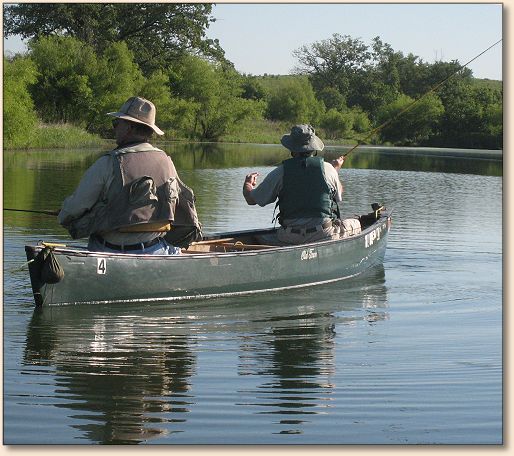
I cut straight across and began fishing the east side at a point
midway along its shoreline. From there I progressed slowly
northward toward the pond's shallow end, but not before catching
this nice bass on a tan marabou sparkle fly – one of Rick's
creations that he told me is good on crappies.
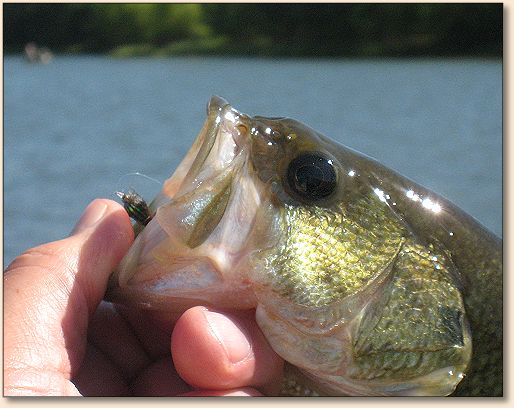
I also caught a number of female bluegills whose bellies appeared
swollen with eggs. These fish I released.
The east side of this pond has an area of submerged stumps. During
my earlier cold weather visit here Rick had lit into the crappies
and bluegills bigtime. I hadn't thought to ask him before this trip
if those stumps are a good spot during warm weather, too. Surely
they are and if so, I wanted Rick and Dave to have first crack using
their two lines instead of my one.
Besides, during my first visit here I'd not explored any of the
pond's shallow end and this morning that north end looked very
interesting. Given the early hour, it seemed a no-brainer that
lots of panfish would still be in those cool shallows hunting
insects and minnows.
This pond is quite wide and long. (See Rick's Panfish story titled
"Saturday Washout" that contains photos of it.) Once our boats
separated it became nearly impossible to converse with Rick and
Dave due to distance. And by the time they quit the west shore
and crossed to the east side to fish the stumps, I'd moved well
north of that spot. My persistent northward movement thus kept
my partners directly astern where I couldn't see how they were
doing without twisting my head around like an owl.
I was not, however, totally out of contact. "Happy fisherman"
sounds soon began emanating from the submerged stump area behind
me. I smiled: the fellas were back there gettin' into 'em.
This information was useful indirectly: the farther north (shallower)
I went the deader the action became. Indeed, once I moved beyond
the first spot I anchored on this side, forty-five minutes elapsed
when I couldn't attract a single strike despite using four different
flies. The action was happening in the deeper half of the pond.
Eventually I conceding that the fish either were not in the shallow
half this morning or else I was not doing what was needed to entice
them. I decided to paddle south to the pond dam, retool and start
anew. Dave and Rick some minutes earlier had moved out of this area
so any fish still holding there had likely stopped hyperventilating.
I would endeavor to re-activate their predatory reflexes by retrieving
through their habitat a certain nymph I've come to like a lot. You
know the one.
A few casts thrown parallel to the weedline brought a sharp hit
from this eager beaver:
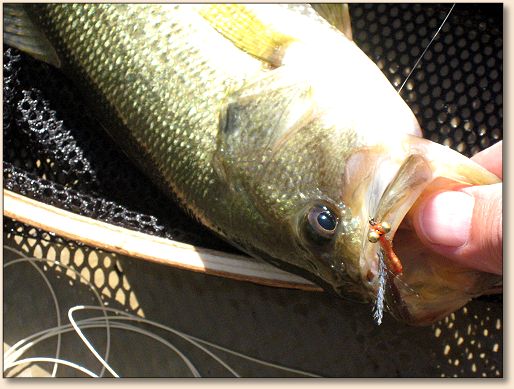
Hoisted aloft for a photo op, Mr. Bass glared at me with his left eye
and with his right eye glared at Rick and Dave anchored in the distance,
probably trying to decide which of these two enemy watercraft was the
first he'd love to see hit a mine and explode.
From the east foot of the dam I moved north a short ways and began
working a sizeable shoreline inset. If I could name this spot I'd
call it Panfish Bay. The bottom slopes out gradually to a depth
around six feet then drops sharply into water that is deeper than
my anchor lines are long. I began casting to its curving weedline,
dropping Old Reliable as close as I could without snagging. On the
third or fourth cast a fish grabbed my nymph and swam straight at
me, resisting with what felt like little puny head shakes before
recognizing the danger, swapping ends and taking off the other
direction like a runaway freight train. My leader didn't break,
but not for lack of the fish trying. This long-line release artist
probably was a big bass. It may also have been one of the huge
crappies Rick does battle with in this pond from time to time.
I never saw the fish.
Only ten feet to the north of where Big Boy grabbed my nymph, I threw
into a small patch of weedline whose edge was home to some very big
bluegills. They welcomed Old Reliable with open arms. One rooster
'gill was 10-inches, pushing 11-inches long.
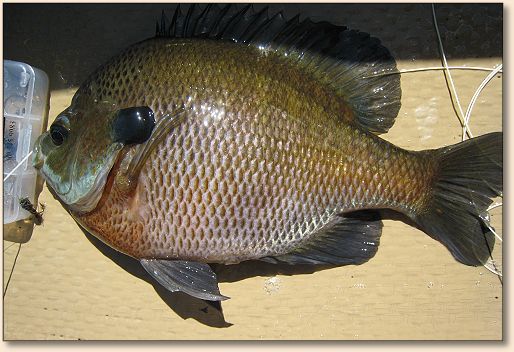
After photographing this behemoth I paddled over to Rick's canoe seeking
advice. Rick applies a "keep or release" formula that encourages panfish
growth in ponds he fishes; I wanted to support his effort but didn't know
how a bluegill this big should be treated.
The verdict: keep him. As Rick lowered his wire basket (with my big 'gill
it's newest inhabitant) back into the pond, I caught a glimpse of a tail
fin connected to a large crappie. He told me he'd caught it along the
west shore only minutes after we'd launched. Folks, you gotta watch
Rick Zieger like a hawk; you just never know when he'll catch a crappie
so big it makes your heart skip a beat.
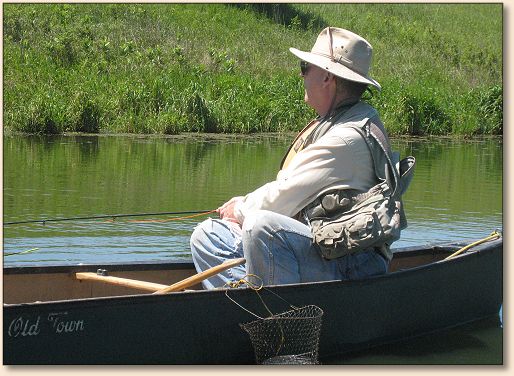
At 11AM we anchored both canoes near one another, and then from thirty
feet out the three of us bombarded the pond dam's weedy fringe. On his
next trip here Rick will benefit from the marksmanship of his bow turret.
Dave, you see, was deliberately throwing long; his fly repeatedly plopped
down amidst the tangle of leafy pondweed that Rick and I were trying
hard to avoid. Snagging his quarry, Dave would use straight pulls to
break away multiple stalks of the offending weed, after which he would
drag his trophy out to Rick's canoe for burial at sea. After cleaning
off his hook he would cast long into the same spot again, snag another
batch of leafy pond weed, drag it out to the canoe, and so on.
"I'm opening future casting lanes back to where the fish are," Dave
explained to us matter-of-factly. Moments later, by accident, I
threw long into the pondweed. As if to vindicate the logic behind
Dave's technique a huge bluegill instantly swirled up, engulfed Old
Reliable virtually on the surface then jumped straight into the air.
Like a bass, only tastier?
Oh, and before I forget: Dave's expertise at opening casting lanes
is something not every pond owner or fishermen possesses – or even
wants to master when you take into account modern society's already
over-burdened work schedules. Indeed, as a service to the public
Dave hires himself out for this task. His fee is quite reasonable:
thirty dollars an hour on-pond time, plus travel expenses to include
beer and cigar money. Think about it.
Where was I? Oh, right. As noon approached I assumed we'd be
leaving soon. The whole morning I had not fished the west
shoreline and before leaving I wanted to give it a few minutes.
I excused myself from Bombardment Row and paddled to a point
just north of where Rick and Dave had launched four hours earlier.
Spotting a nice gap in the weedline (thank you, Dave!), I whipped
Old Reliable into it and quickly bagged three big bluegills on a
half dozen casts. Immediately suspecting that a school of big 'gills
was occupying this spot I called out to Rick, asking if he could bring
Dave over so he could cash in on the fruits of his own labor.
No sooner did Rick move into position and lower his stern anchor
than Dave's helping nature compelled him to shoot two casts into
a willow tree whose branches overhang this hot spot. Unfortunately,
his 3-wt. rod and 3X leader were too weak to uproot and remove this
irritating obstruction. The good news is he was able to free both
casts from the willow's branches, which enabled his fly to drop into
open water where it tempted a nice bass that he neatly hooked,
boated and released.
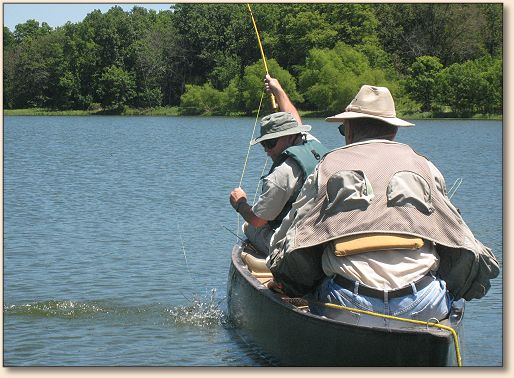
This trip marked the first time I've watched two fly fishers
operating together out of a tandem canoe. I took careful note
of how they handled the risky business of casting. The fear of
two long rods getting waved around in a tandem canoe has been a
phobia of mine ever since the day two years ago when I fished
with my buddy, Donnie, in his tandem canoe. We both had fly
rods that day and it was a miracle we didn't whack our rods
together and fracture them both, as we were constantly casting
at the same time -- from habit formed during years of standing
side-by-side on farm pond shorelines using much shorter spinning
rods.
When I described my phobia to Rick the evening before our trip,
he shrugged and said, "Dave and I take turns casting. One of
us will cast first, the other one waits. Once that first line
is down on the water then the other guy casts. That way our
rods don't collide."
Well...DUH! I need adult supervision to figure out some of
the simplest things. ~ Joe
About Joe:
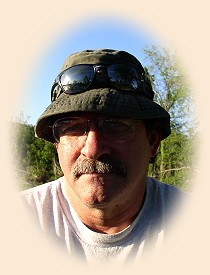 From Douglas County, Kansas, Joe is a former municipal and
federal police officer, now retired. In addition to fishing, he hunts
upland birds and waterfowl, and for the last 15 years
has pursued the sport of solo canoeing. On the nearby
Kansas River he has now logged nearly 5,000 river miles
while doing some 400 wilderness style canoe camping
trips. A musician/singer/songwriter as well, Joe recently
retired from the U.S. General Services Adminstration.
From Douglas County, Kansas, Joe is a former municipal and
federal police officer, now retired. In addition to fishing, he hunts
upland birds and waterfowl, and for the last 15 years
has pursued the sport of solo canoeing. On the nearby
Kansas River he has now logged nearly 5,000 river miles
while doing some 400 wilderness style canoe camping
trips. A musician/singer/songwriter as well, Joe recently
retired from the U.S. General Services Adminstration.
Joe at one time was a freelance photojournalist who wrote the
Sunday Outdoors column for his city newspaper. Outdoor
sports, writing and music have never earned him any money,
but remain priceless activities essential to surviving the
former 'day job.'
|







 From Douglas County, Kansas, Joe is a former municipal and
federal police officer, now retired. In addition to fishing, he hunts
upland birds and waterfowl, and for the last 15 years
has pursued the sport of solo canoeing. On the nearby
Kansas River he has now logged nearly 5,000 river miles
while doing some 400 wilderness style canoe camping
trips. A musician/singer/songwriter as well, Joe recently
retired from the U.S. General Services Adminstration.
From Douglas County, Kansas, Joe is a former municipal and
federal police officer, now retired. In addition to fishing, he hunts
upland birds and waterfowl, and for the last 15 years
has pursued the sport of solo canoeing. On the nearby
Kansas River he has now logged nearly 5,000 river miles
while doing some 400 wilderness style canoe camping
trips. A musician/singer/songwriter as well, Joe recently
retired from the U.S. General Services Adminstration.